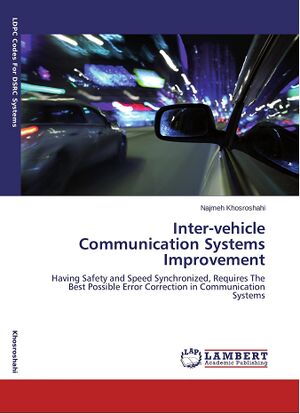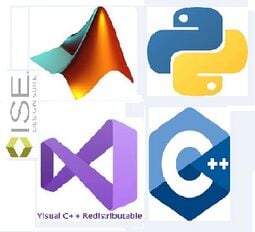Academic Background[edit | edit source]
Najmeh Khosroshahi obtained her Master's of Applied Science from University of Victoria, Victoria, B.C., Canada and Bachelor's of Applied Science from University of Tehran, Tehran, Iran both in Electrical Engineering with a minor in Wireless Communications.
Research Interests[edit | edit source]
- Artificial Intelligence(AI)
- Applied Sustainability Technology
- Human Factors and Ergonomics
- Smart Grid(SG) Applications
- Signal/Image/Video Processing
- Wireless Communication Networks
- Intelligent Transportation Systems(ITS)/ Electric Vehicles(EV)
- Machine Learning(ML)/ Deep Learning(DL)
Publications[edit | edit source]

Published Book:
- Inter-vehicle Communication Systems Improvement: Having Safety and Speed Synchronized Requires the Best Possible Error Correction in Communication Systems
- Publisher : LAP LAMBERT Academic Publishing (March 11, 2014)
- Language : English
- Paperback : 100 pages
- ISBN-10 : 3659393983
- ISBN-13 : 978-3659393983
- Item Weight : 5.6 ounces
- Dimensions : 5.91 x 0.23 x 8.66 inches
- N. Khosroshahi and T. A. Gulliver,"Low Density Parity Check (LDPC) Codes for Dedicated Short Range Communication (DSRC) Systems", IEEE Pacific Rim Conference on Communications, Computers and Signal Processing, University of Victoria, Victoria, B.C., Canada, August 2009.
- N. Khosroshahi and T. A. Gulliver,"Quasi-Cyclic Low Density Parity Check Codes for Dedicated Short Range Communication(DSRC) Systems", CCECE Canadian Conference on Electrical and Computer Engineering, Calgary, AB, Canada, May 2010.
Seminar:
- N. Khosroshahi,"Quasi – Cyclic LDPC Codes for Dedicated Short Range Communication (DSRC) Systems", Department of Electrical and Computer Engineering, University of Victoria, Victoria, B.C., Canada, July 2011.
Thesis Research Topic[edit | edit source]

Low Density Parity Check(LDPC) Codes for Dedicated Short Range Communication(DSRC) Systems. DSpace_Link
- Analyzation/optimization of Forward Error Correction(FEC) coding method applied in inter-vehicle wireless communication systems.
- Suggestion of Low Density Parity Check (LDPC) Codes with less complexity therefore less expenses as an FEC coding method with much better performance in compare with conventional Convolutional coding method in Dedicated Short Range Communication(DSRC) systems.
- Investigation of the Quasi-Cyclic LDPC codes' feasibility for DSRC systems via MATLAB programming and presenting it as a simpler, less expensive and even more efficient coding technique for DSRC systems which is considered as an Internet of Thing(IoT) in Intelligent Transportation Systems(ITS).
Software and Programming Skills[edit | edit source]

Programming Languages Skills
- MATLAB, Microsoft Visual C++, VHDL (Xilinx ISE Simulator and Programming) - Advanced
- Python, Verilog (ModelSim Simulator and Programming), Dreamweaver/HTML - Intermediate
Design and Simulation Skills
- MATLAB, MATLAB-Simulink, Xilinx ISE Simulator and Programming (VHDL for FPGAs Virtex5 and Spartan3)-Advanced
- OPNET(Network Simulator), PSPICE/HSPICE(Analog Circuit Simulator), MAX+PLUS and Altera Quartus (Verilog for PLDs, MAX 7000s) - Intermediate
Software Skills
- LaTeX, Cool Edit, MSOFFICE (Word, PowerPoint, Excel, Visio, FrontPage/HTML) - Advanced
- Altium Designer(PCB Design Software and Tools) - Beginner
Relevant Training Courses[edit | edit source]
- Python in Machin Learning(ML), 72-Hour (Online Course)
- MATLAB for development of wireless communications (specifically FEC block), 160-Hour
- MATLAB for the sanity check and quality assurance of the product - 180-Hour
- Microsoft Visual Studio C++ software programming for developing test procedure/providing GUI, 180-Hour
- Xilinx ISE Simulator and Programming software/VHDL for analog/digital processing boards, 180-Hour
- CDMA, Wi-Fi, UMTS technologies, 16-Hour
- C++ for Electrical Engineering, 72-Hour (Online Course)
References[edit | edit source]
| T. Aaron Gulliver | Mahmoud Shahabadi | Nasser Masoumi | Renato Sitton | Saman Mardani |
|---|---|---|---|---|
| Professor | Professor | Professor | Team Lead | Chairman of the Board |
| University of Victoria | University of Tehran | University of Tehran | Research In Motion | Pardis Novel Processing Technology |
| agullive@ece.uvic.ca | shahabad@ut.ac.ir | nmasoumi@ut.ac.ir | rsitton@rim.com | saman_mardani@alum.sharif.edu |